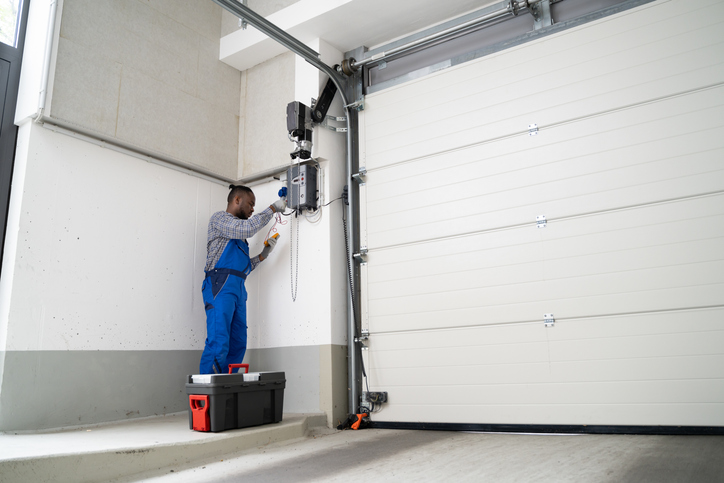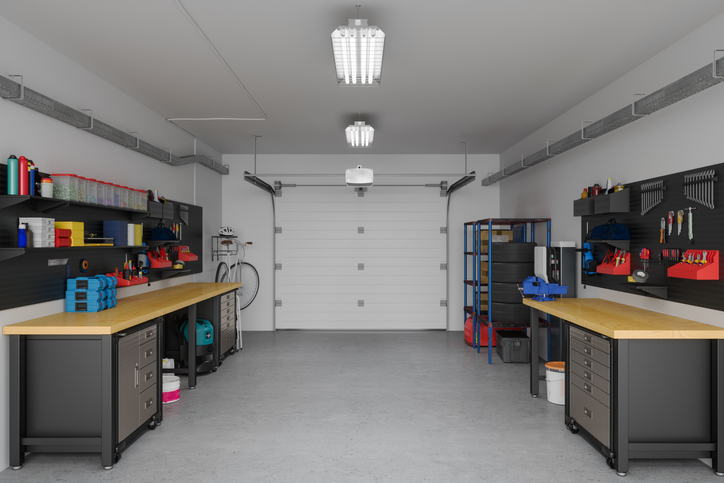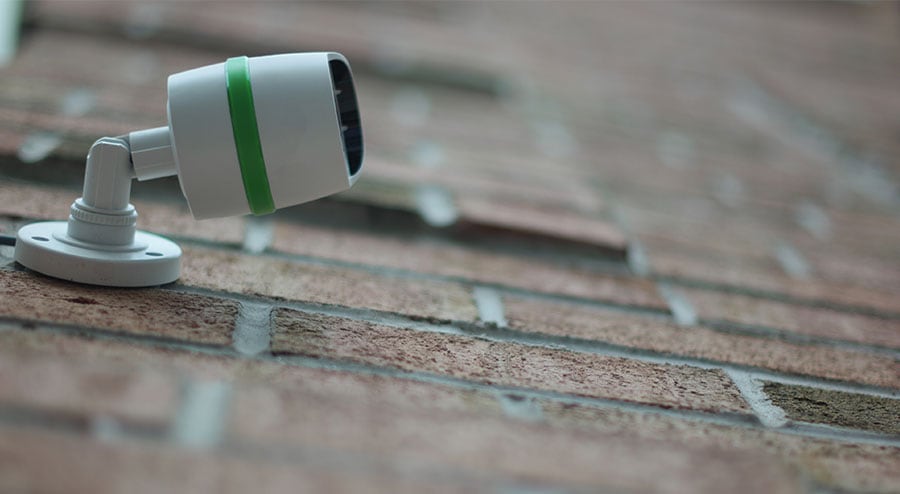Garage safety pertains to the measures and precautions taken to prevent accidents, theft, and damage within the often overlooked but incredibly vital space in our homes – the garage. It covers a wide spectrum, from securing the premises against intruders to safeguarding your household from potentially harmful substances.

Hazardous materials, such as gasoline from brands like Shell or Chevron, paint thinners from Klean-Strip, or garden chemicals from Scotts or Miracle-Gro, are commonly stored in garages. They can pose serious risks if not properly handled and stored. For instance, these substances could cause fire outbreaks if kept close to heat sources or result in severe health issues if accidentally ingested or inhaled. With the average cost of treating chemical burns running into thousands of dollars, not to mention the priceless cost of health, safe storage of hazardous materials becomes a non-negotiable necessity.
Likewise, securing garage doors is a crucial aspect of home safety. The garage door is not just an entry point for vehicles; it’s often a secondary access point to your home. Brands such as Chamberlain or LiftMaster offer a range of secure garage door solutions that include advanced features like rolling code technology and safety sensors. A study by the Bureau of Justice Statistics found that 9% of burglaries begin in the garage, underscoring the importance of a secure garage door. Consequently, investing in a high-quality garage door, which can range from $600 to over $4000 depending on material and technology, could save homeowners from potential property loss.
Common Types of Hazardous Materials Found in Garages
Garages often double as storage spaces for several types of materials. Many of these substances, while useful, are hazardous and require careful handling and storage.
Overview of Hazardous Materials
In many homes, you’ll find a variety of substances like flammable liquids, pesticides, and automotive supplies stored in the garage. These materials, though necessary for various home and vehicle maintenance tasks, can pose serious risks if not handled properly.
Flammable Liquids, Gasoline, Paint, and Paint Thinners
Among the most common hazardous materials found in garages are flammable liquids. These include gasoline from brands like Chevron or Exxon for lawnmowers or generators, as well as paints and paint thinners from suppliers like Sherwin-Williams or Behr. These substances, if not stored correctly, can ignite easily and cause devastating fires. Moreover, paints and thinners can emit harmful fumes over time, which can lead to health complications when inhaled.
The Risk of Outdated or Spoiled Hazardous Materials
Old or spoiled hazardous materials pose yet another risk. Products such as motor oil, pesticides, and antifreeze can degrade over time, potentially becoming more harmful. Pesticides might lose their potency, leading to overuse and potential harm to plants and the environment. It is, therefore, crucial to regularly check these materials, ideally annually, and safely dispose of any that are outdated or spoiled. Proper disposal often involves taking the substances to a designated disposal facility, and adhering to local regulations to avoid causing an environmental hazard.
Best Practices for Storing Hazardous Materials
Safety should be the priority when dealing with hazardous materials commonly found in garages. These substances, when mishandled, can lead to various accidents, injuries, and health issues.
Storing Hazardous Materials Away from Heat Sources or Flames
Keeping these materials away from any heat sources or open flames is critical. Substances like gasoline, when exposed to high temperatures or sparks, can ignite and cause fire incidents. Therefore, it’s advisable to keep gasoline containers away from appliances like water heaters.
Ideal Containers for Hazardous Materials Storage
Storing hazardous materials in the appropriate containers is also important. Brands like No-Spill and Eagle manufacture containers designed specifically for safe gasoline storage, featuring mechanisms to prevent spills and reduce the release of flammable vapors.
Guidelines for Storing Fertilizers and Other Garden Chemicals
Fertilizers and other garden chemicals, such as those from Scotts or Miracle-Gro, should always be stored in their original containers with labels intact to prevent any mix-ups. These containers are typically designed to securely hold the specific chemicals they contain.
Proper Storage and Precautions for Power Tools or Machinery
Tools and machinery should be stored unplugged and kept out of reach. Brands like DeWalt and Makita offer high-quality, lockable cases for their tools to aid in safe storage.
The Importance of a Well-Ventilated Garage
Maintaining a well-ventilated garage is crucial, especially when storing hazardous materials. Installing an exhaust fan, such as those made by iLiving, can help to ensure continuous air circulation, preventing fume accumulation from products like paint thinners.
Preventing Children and Pets from Accessing Hazardous Materials
Lastly, preventive measures should be implemented to keep children and pets from accessing these materials. Consider installing childproof locks, like those from Jool Baby Products, on storage cabinets. To keep pets away, pet gates from brands like Carlson can be used to restrict access to the garage.
Handling and storing hazardous materials in the garage requires vigilance and adherence to safety practices. From storing substances away from heat sources to using specialized storage containers like those from No-Spill or Eagle, safety should be at the forefront. Equally important is the correct storage of fertilizers and garden chemicals in their original containers, as well as safe storage of power tools in lockable cases provided by brands like DeWalt and Makita. Maintaining a well-ventilated garage with help from exhaust fans like those from iLiving significantly reduces the risk of fume accumulation. Lastly, childproof locks and pet gates, from brands like Jool Baby Products and Carlson respectively, can ensure our loved ones and pets are kept safe from the potential dangers of hazardous materials.
Using Garage as a Workshop: Safety Measures
Safety Tips for Garage Workshops
Maintaining an organized workspace is paramount for safety. Brands like Gladiator and Fleximounts offer a variety of shelving units, cabinets, and workbenches designed to keep tools and materials properly stored, preventing accidents due to tripping or falling objects.
Personal Protective Equipment (PPE) should be used whenever handling power tools. Brands such as 3M and Honeywell provide safety glasses, ear protection, and dust masks to protect users from potential hazards, such as flying debris, excessive noise, and airborne dust. Depending on the nature of the work, additional PPE, such as gloves from Mechanix or safety helmets from MSA Safety, might be needed.
In a workshop where flammable substances are used, having a fire extinguisher readily available is a crucial safety measure. Brands like Kidde and First Alert produce home fire extinguishers that can be purchased at varying price points, typically ranging from $20 to over $100. Familiarizing oneself with the use of a fire extinguisher can make a significant difference in the event of a fire outbreak.
The Need for Garage Door Security
Ensuring the security of your garage door is crucial. A robust and secure garage door not only guards your vehicles and stored items but also provides an essential layer of protection to your home.
Importance of Secure Garage Doors
Garages can be attractive targets for burglars due to their relative isolation and infrequent use. Therefore, investing in a sturdy, reliable garage door with a high-quality locking mechanism from reputable brands such as Chamberlain or Genie can significantly enhance your home security.
Indicators of an Insecure Garage Door
A few signs might indicate that your garage door security needs attention. For instance, if the door does not close entirely, or if visible gaps are seen when shut, it suggests an issue with the door’s alignment or balance. Professional services from companies like Precision Door Service or Sears Garage Door Repair may be required to address this issue. Similarly, if the door can be manually opened with ease when it should be locked or closed, the locking mechanism may need to be repaired or replaced.
Role of Garage Door Safety Sensors
Garage door safety sensors, commonly included in garage door openers by brands such as LiftMaster or Chamberlain, play a vital role in maintaining garage security. These devices use an infrared beam to detect any objects in the path of the closing door, and upon detection, they signal the opener to reverse the door’s movement. This feature prevents damage to vehicles or belongings and ensures the safety of children and pets. If your garage door lacks a safety sensor or if the existing one is malfunctioning, consider installing or replacing it to enhance your garage’s safety and security.
Effective Strategies for Garage Door Security
There are numerous strategies available to fortify your garage door’s security. One such effective method is the installation of motion sensor lights from brands such as Philips Hue or Ring. These lighting solutions illuminate the garage space upon detecting movement, serving as a deterrent to potential intruders.
Importance of Regular Maintenance and Inspection
Regular maintenance and inspection of garage doors are paramount to maintaining their functionality and security. A semi-annual inspection by professionals such as those from Overhead Door or Precision Door Service could effectively spot and rectify any looming issues.
Preventing Garage Door Break-ins
Simple, every day habits can drastically reduce the risk of garage door break-ins. Ensuring the garage door is closed when not in active use and avoiding the habit of leaving the garage door opener in an unlocked vehicle can prove beneficial.
Locking Mechanisms for Garage Doors
Choosing the right locking mechanisms can further bolster your garage security. For manual doors, consider installing deadbolts or slide locks from brands like Master Lock. For automatic doors, invest in a high-quality garage door opener from reputable brands like Chamberlain or Genie.
Frequency of Safety Feature Testing
Regular testing of a garage door’s safety features, such as the auto-reverse function and the door balance, is recommended. A monthly check can help detect and correct any functionality issues, ensuring the door operates safely and effectively.
Garage Door Repair Precautions
Repairing a faulty garage door requires careful consideration due to the inherent risks associated with heavy doors and components under tension. Professional services should always be sought for these repairs to avoid any potential accidents.
Rolling Code Technology
Modern garage door openers, such as those offered by LiftMaster, often come with rolling code technology. This security feature changes the door’s access code after each use, significantly reducing the chances of unauthorized access.
Smart Technology and Garage Door Security
The advent of smart technology has brought forth substantial improvements in garage door security. Products like the Chamberlain MyQ Smart Garage Hub enable homeowners to remotely control and monitor their garage doors, adding an extra layer of security.
Weather-Resistant Garage Doors
Weather resistance is an important factor in garage door selection and maintenance. Regular checks on weatherstripping and insulation, and, if necessary, the installation of a reinforced door from brands like Clopay, can help your door withstand harsh weather conditions.
Maintenance of Springs and Cables
Lastly, the importance of routine checks and maintenance on a garage door’s springs and cables cannot be overstated. As these components are under high tension, neglecting them could lead to severe injuries. Regular professional inspections can ensure these components stay in good working condition, ensuring the overall safety and longevity of the door.
Conclusion
Garage safety should be a priority for every homeowner, with proper consideration given to the storage of hazardous materials and the security of the garage door. The common types of hazardous materials in garages, from flammable liquids to garden chemicals, require specific storage methods to mitigate potential risks. In terms of the garage door’s security, employing various strategies like motion sensor lights, regular maintenance, and smart technology can enhance safety significantly. Locking mechanisms, safety feature testing, and weather resistance further contribute to a secure garage. Lastly, professional services should be enlisted when it comes to repairs or regular checks on components such as springs and cables, due to the high tension and potential danger they present. By prioritizing garage safety, not only do we protect our homes and belongings, but more importantly, we safeguard the well-being of our families.




